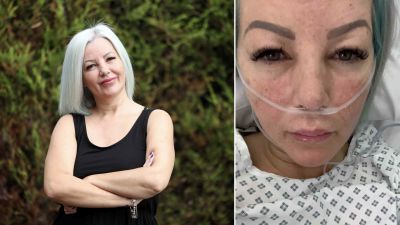'It is a massive relief': Newcastle teacher in remission after treatment for ovarian cancer

A teacher from Newcastle has spoken of her "massive relief" after going into remission for a cancer known as the "silent killer".
Emma Durkin was diagnosed with ovarian cancer earlier this year and is officially in remission after five courses of treatment.
The 48-year-old, who lives in West Denton, initially thought she was starting the menopause when her periods became irregular.
She started to suffer from pain and was told she had an abscess on her right ovary which needed to be drained.
Doctors at the Royal Victoria Infirmary (RVI) also found a cyst on her left ovary and removed both during keyhole surgery.
They took a biopsy during the procedure which revealed she had ovarian cancer.
Last week, Ms Durkin rang the bell at the Freeman Hospital in Newcastle with her grandchildren Zak, Daisy and Violet.
She said: "It's a massive relief. It's been a long time coming, it's been a hard six months.
"I was really happy and eventually cried tears of joy. Just months and months of suffering, brutal chemotherapy, the two lots of surgery I have had lots of side effects.
"It just means the times I have wanted to just give up we’re all worth it."
Ms Durkin received the good news from her doctor after her fourth round of chemotherapy.
"I saw my oncologist last Wednesday and he said 'You're officially in remission, we're not going to do any more chemo'."
Ms Durkin, who is mum to Laura, 30, and Daniel, 27, is now being put on maintenance treatment for two years to prevent the cancer from returning.
She said: "It's kind of bittersweet. They know there's a chance it could return but I have got to try and put that at the back of my mind.
"Hopefully it's onwards and upwards now. I don't look at life the same way anymore. I'm not out of the woods but I'm doing it and I'm getting there so fingers crossed!
"The last year has been up and down. It's been surreal a lot of the time and it's been heartbreaking. It's been really hard. The chemotherapy has been brutal but I have had to go through it to get better."
"I have had amazing support. I'm on maintenance treatment for two years, it's a tablet I take everyday. I'm hoping to be back at work in about March time."
Ms Durkin was inundated with support after sharing her story.
She said she has made friends with others battling ovarian cancer because of the publicity and during chemotherapy treatment.
She previously called for more awareness of the disease as she believes women are not as aware of ovarian cancer as they are of other types, such as breast cancer.
She said: "I had no awareness of ovarian cancer and naively thought that smear tests pick up on all gynaecology cancers.
"I have never met anybody in the early stages of ovarian cancer, it's always been stage three or four. It's not being picked up sooner. The awareness is just not there. It's just frustrating."
Ms Durkin has urged women to get checked out if they have any issues and not to be scared of having treatment such as chemotherapy.
What is ovarian cancer?
Ovarian cancer affects the 2 small organs (ovaries) that store the eggs needed to make babies.
Anyone with ovaries can get ovarian cancer, but it mostly affects those over 50.
Sometimes ovarian cancer runs in families.
The symptoms of ovarian cancer, such as bloating, are not always obvious.
Ovarian cancer is often diagnosed late, but early diagnosis can mean it is more treatable.
What are the symptoms of ovarian cancer?
Symptoms of ovarian cancer include frequently (roughly 12 or more times a month) having:
a swollen tummy or feeling bloated
pain or tenderness in your tummy or the area between the hips (pelvis)
no appetite or feeling full quickly after eating
an urgent need to urinate or needing to urinate more often
Source: NHS England
Want a quick and expert briefing on the biggest news stories? Listen to our latest podcasts to find out What You Need To know...